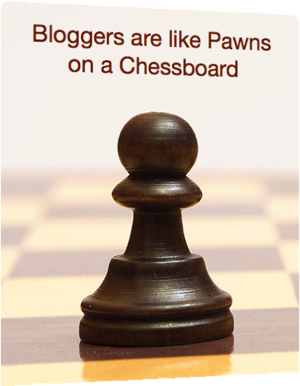| 正面 | 13021.pawn 英 [pɔːn]美 [pɔn]     |
|---|---|
| 背面 |      释义: 1. foot, pedal, pioneer => pawn.2. pioneer => pawn.3. literally, means etymologically 'footsoldier'.4. The foot-soldier being the lowest of the low in the army, the term came to be applied to the 'chess piece of lowest rank'.n. 典当;抵押物;兵,卒;人质vt. 当掉;以……担保 例句: 1. He had no way to redeem his furniture out of pawn.他无法赎回典当的家具. pawn 走卒来自古法语peon,兵,卒,来自拉丁语pedonem,步兵,来自拉丁语pedis,脚,来自PIE*ped,脚,词源同foot,biped.最初用于国际象棋卒,后引申词义走卒。pawn 质押,典当来自古法语pan,承认,担保,可能来自该词的另一个词义pan,布,一块布,来自拉丁语pannum, 一块布,衣服,词源同pane,panel.其原义可能为以衣服作为质押或在布上写上契约。 pawnpawn: English has two words pawn. The older, ‘chess piece’ [14], means etymologically ‘footsoldier’. It comes via Anglo-Norman poun from medieval Latin pedō ‘infantryman’, a derivative of Latin pēs ‘foot’ (to which English foot is related). The foot-soldier being the lowest of the low in the army, the term came to be applied to the ‘chess piece of lowest rank’. (English gets pioneer from a derivative of paon, the Old French version of poun.) Pawn ‘pledge as security for a loan’ [15] comes via Old French pan ‘security, pledge’ from a prehistoric West Germanic *panda (source of modern German pfand ‘pledge, security, pawn’). Penny may go back to the same source.=> foot, pedal, pioneer; pennypawn (n.1)"something left as security," late 15c. (mid-12c. as Anglo-Latin pandum), from Old French pan, pant "pledge, security," also "booty, plunder," perhaps from Frankish or some other Germanic source (compare Old High German pfant, German Pfand, Middle Dutch pant, Old Frisian pand "pledge"), from West Germanic *panda, of unknown origin. The Old French word is identical to pan "cloth, piece of cloth," from Latin pannum (nominative pannus) "cloth, piece of cloth, garment" and Klein's sources feel this is the source of both the Old French and West Germanic words (perhaps on the notion of cloth used as a medium of exchange).pawn (n.2)lowly chess piece, late 14c., from Anglo-French poun, Old French peon, earlier pehon, from Medieval Latin pedonem "foot soldier," from Late Latin pedonem (nominative pedo) "one going on foot," from Latin pes (genitive pedis) "foot," from PIE root *ped- (1) "a foot" (see foot (n.)). The chess sense was in Old French by 13c. Figurative use, of persons, is from 1580s.pawn (v.)"to give (something) as security in exchange for," 1560s, from pawn (n.1). Related: Pawned; pawning." |